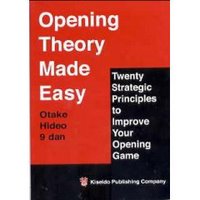Kyu Review: Opening Theory Made Easy
 This book, surprisingly, is not widely available at retail.
This book, surprisingly, is not widely available at retail.I suggest you buy it directly from Kiseido.
In the SF Bay Area, it is sold at Kinokuniya Bookstore.
Book Summary
Title: Opening Theory Made Easy
Publisher & ISBN: Kiseido Publishing Company, 490657436X
Price & Sources: $15.00 from Kiseido (excl S&H)
ChiyoDad's Rank Suitability Assessment: Introductory to Intermediate
ChiyoDad's Rating: 5/5 - Add it to your library
Review
Of the books that I have in my library to-date, I would have to credit this one with giving my playing ability a sudden boost. It also gave me a better appreciation of the importance of the opening moves and why pros spend so much time on these. Today, I'm still re-reading its chapters to further imprint Otake Hideo's 20 strategic principles in my mind.
When you scan the index, you might get the impression that it's just a list of some proverbs straight out of the Nihon Ki-in handbook. Otake's book differs in that he provides many examples of how to apply these principles and a good explanation of why each of these should be considered and, in some cases, when they shouldn't. His style of writing is clear (perhaps just a tad folksy) and the book is as generous with diagrams as Janice Kim's Learn To Play Go
Like with the Nihon Ki-in Handbook of Proverbs, you can non-sequentially jump from one section of the book to another. The benefit of this is that you can absorb the principles in whatever order urgently addresses your weaknesses. I encountered a lot of "Geez! That's what I'm doing wrong!" moments when I read this book, and I wound-up taking it with me almost everywhere so I could get ideas whenever I had as little as five minutes of free time.
You might find yourself trying to decide between Otake's book and In The Beginning
- Otake's Opening Theory has more ideas but a little less depth. Beginners as low as 30k (by KGS ranking, which tends to underrank ability) can immediately benefit from it but that does not lower its value even to intermediate-level players.
- Ishigure's In The Beginning has fewer ideas but more depth and it discusses tactics. It needs to be read sequentially and may take more time to absorb. Use it to build on some of the principles in Otake's book. I am reading it now because I'm running into other players who are able to apply Otake's principles against me.
Chapter 1: Fuseki Fundamentals
- Prin 1: Corner enclosures aim at side extensions
- Prin 2: Be flexible in deploying the star point
- Prin 3: Find the right pincer
- Prin 4: Have a counterplan to deal with invasions
- Prin 5: The 5-4 stone aims at outside influence
- Prin 6: The 4th line is the line of development. The 3rd line is the line of completion.
- Prin 7: Build box-like moyos
- Prin 8: Family feuds waste resources
- Prin 9: Don't permit a hane at the head of your stones
- Prin 10: You can never catch-up if you push from behind
- Prin 11: The empty triangle is a bad shape
- Prin 12: The ponnuki is worth 30 points
- Prin 13: Don't atari automatically
- Prin 14: Attack the opponent by stealing his base
- Prin 15: Don't attach against weak stones
- Prin 16: Try to kill two birds with one stone
- Prin 17: Use thickness to attack
- Prin 18: Keep away from solid positions
- Prin 19: Reduce a large moyo lightly
- Prin 20: Don't cling to stones that have served their purpose





1 Comments:
I'm around 25k on KGS, and this book is one of my two favorites, the other being Michael Redmond's "The ABC's of Attack and Defense."
Both are well written, and I've been able to understand and use the advice.
By the way, I noticed that you've found Games of Berkeley, but you might also be interested to know that Eastwind Books (top of University near Shattuck) has a good Go section. It's not as extensive as Games of Berkeley, but they carry some titles that I haven't seen elsewhere.
Post a Comment
<< Home